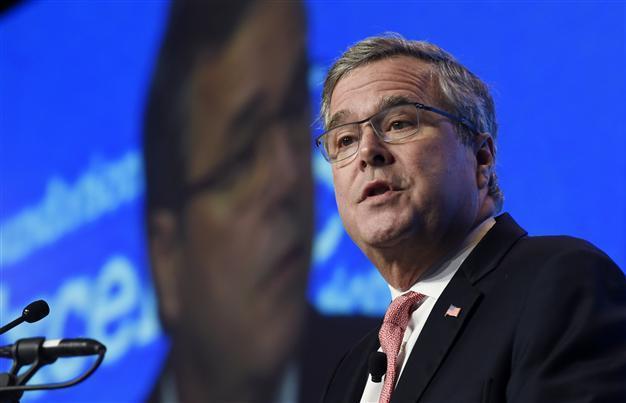Jeb latest Bush to launch US presidential bid
WASHINGTON - Agence France-Presse

Jeb Bush on Dec. 16 took his most definitive step yet toward running for president, announcing plans to actively explore a campaign and form a new political operation allowing him to raise money for like-minded Republicans. AP Photo
Jeb Bush, son to one former US president and brother to another, threw his hat into the ring for the 2016 race Tuesday, announcing he was laying the groundwork for a campaign.
The 61-year-old former Florida governor said he has "decided to actively explore the possibility of running," making him the first serious Republican contender to announce a likely run.
Jockeying is underway ahead of primaries to choose a challenger for presumptive Democratic frontrunner Hillary Clinton in the election to decide the successor to President Barack Obama.
But the announcement of such a high-profile figure essentially shifts the 2016 White House race into full gallop.
Other Republicans -- and there are many contemplating a run -- are now on notice that the clock is ticking.
Creating an exploratory committee would permit Bush to start raising funds legally and traditionally signals the first official step in a presidential campaign process.
His statement did not officially announce an exploratory committee, but a declaration to "actively explore the possibility" is a pretty clear signal in US politics.
"In January, I also plan to establish a leadership PAC that will help me facilitate conversations with citizens across America to discuss the most critical challenges facing our exceptional nation," Bush said.
On Sunday, Bush had said he would decide "in short order" whether he will seek to follow his brother George W. Bush, president from 2001 to 2009, and their father George H.W. Bush, 1989 to 1993.
Senator John McCain, the 2008 Republican nominee, told AFP he had expected the Bush announcement.
When it comes to wooing the conservative Republican base in his own party's primaries, Bush could suffer from his seven-year absence from the political scene and largely centrist positions.
In particular, his moderate stance in the explosive US immigration debate -- he has proposed extending legal papers to some classes of illegal immigrant -- may hurt his chances.
"Immigration will be a critical issue in this next election," Senator Ted Cruz, a possible presidential candidate who rails against Obama's plan to shield millions from deportation, told reporters.
Bush is seen as less ideological than conservatives like Cruz, Senator Rand Paul, Texas Governor Rick Perry and former Arkansas governor Mike Huckabee.
Cruz, Paul and another potential candidate from Florida, Senator Marco Rubio, have launched leadership PACs -- political action committees -- that are fundraising tools seen as steps toward a run.
Bush's move heaps pressure on two Republicans viewed as influential party moderates: New Jersey Governor Chris Christie and defeated 2012 Republican flag-bearer Mitt Romney.
Two-time failed White House challenger Romney has repeatedly said he is not running, but there is a Republican movement to draft him for one final attempt.
In the primaries, the state-wide races which determine a party's presidential nominee, the Republican faithful demand conservative fealty from the candidates.
Earlier this month Bush openly warned about such challenges, saying a nominee should "lose the primary to win the general without violating your principles."
In 2012, with Tea Party conservatives in ascendance, Romney tilted to the right to appease core-value voters during primaries only to balance back to the middle in the general election.
Bush may face headwinds on several fronts, including Bush fatigue.
His brother led America into two wars that proved unpopular, and their mother Barbara Bush acknowledged last year that voters have "had enough Bushes" in the White House.
The younger Bush also shares with Romney a career in off-shore private equity, which may turn off voters. Bush launched the off-shore funds after his two terms as governor.
Multimillionaire Romney's off-shore funds contributed to the ultimate failure of his bid by reinforcing his image as an aloof plutocrat isolated from ordinary American life.
As for the 2016 race, on Sunday he told broadcaster WPLG-TV: "I have no clue if I'd be a good candidate. I hope I would be."
The Democratic Party dismissed Bush's announcement as just another way of seeking to stay relevant.
"Jeb Bush has fully embraced the failed economic agenda that benefits only a select few at the expense of the middle class," Democratic National Committee spokesman Mo Elleithee said.
"That's not going to change no matter how many different ways he says he may run."
